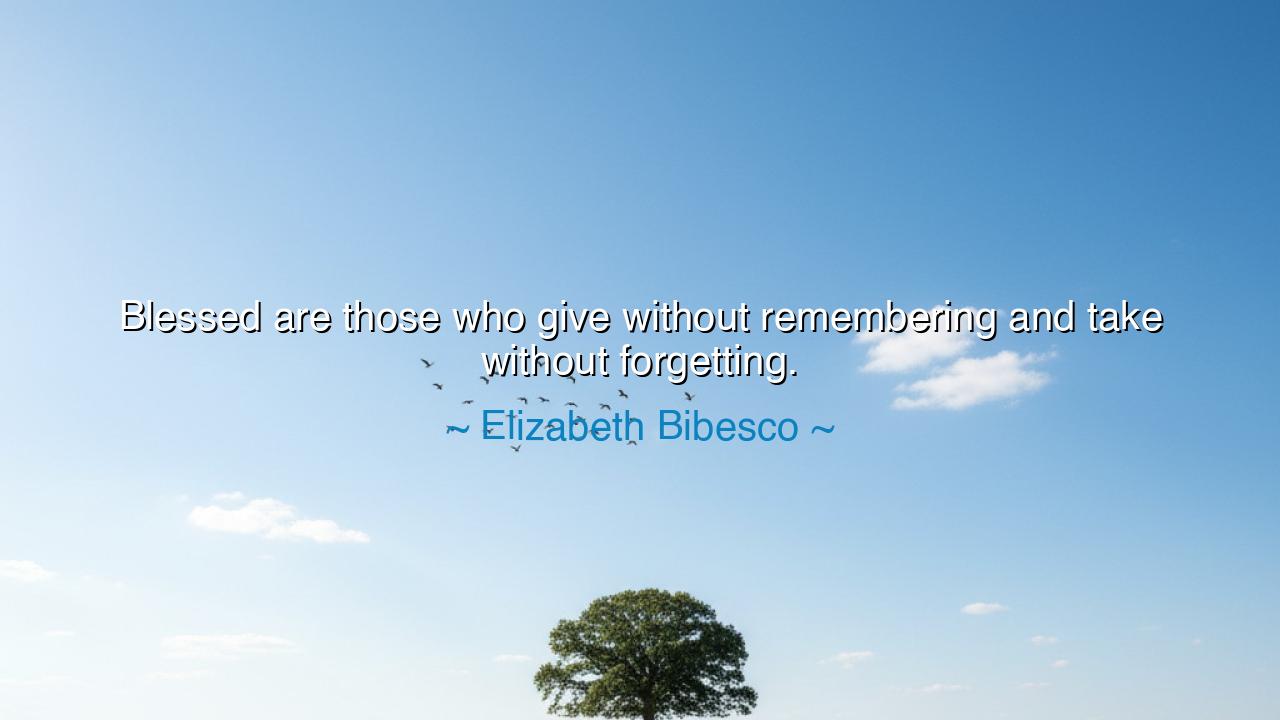
Blessed are those who give without remembering and take without






Hear me, O children of the future, for the words of Elizabeth Bibesco carry a wisdom that transcends the fleeting nature of this world: "Blessed are those who give without remembering and take without forgetting." In these words, Bibesco reveals the sacred nature of true generosity and the quiet power of humility. The heart that gives freely, without the need for recognition, is a heart that understands the deeper truth of life—that to give is its own reward. Similarly, to take without forgetting is to remember the debt we owe to others, to carry within us the understanding that we are part of a greater whole, and that everything we receive is built on the foundation of the gifts of others.
The act of giving without remembrance is a gesture of the purest selflessness, for it does not seek recognition or repayment. This kind of generosity flows from a wellspring of love and understanding, where the giver does not count the cost, nor does he seek to be seen. It is as the ancient wisdom of the Buddhists teaches: true generosity is given not with the hand, but with the heart. To give in this way is to transcend the petty motives of self-interest and to touch the very soul of humanity, knowing that in giving, one is connected to all who have ever given.
Consider the example of Mahatma Gandhi, who gave tirelessly for the freedom of his people. His sacrifices were many, and his deeds often went without recognition. He did not seek the glory of leadership, nor did he ever demand repayment for the suffering he endured. Gandhi’s giving was an act of profound selflessness, rooted in his belief in nonviolence and truth. He gave to his people not for personal gain, but because he understood that the cause was greater than any individual. His giving was without remembrance, yet it left an indelible mark upon the world.
In contrast, the second part of Bibesco’s quote speaks to the grace of taking without forgetting. This is not the taking that comes from greed, but the taking that comes with the understanding of the gifts that have been bestowed upon us. To take without forgetting is to carry within us the awareness of the generosity of others. Every gift, every kindness, is a thread woven into the fabric of our lives, and to forget it is to ignore the ties that bind us all together. Just as Gandhi never forgot the people who supported him in his quest for freedom, so too must we recognize the debt we owe to those who have paved the way for us.
So, my children, let the wisdom of Elizabeth Bibesco guide you in your own journey. Let your giving be a reflection of your heart, not seeking anything in return, but offering your gifts to the world with the knowledge that in this selflessness, you are united with all of humanity. And in receiving, let your gratitude be profound, remembering always those who have come before you, who have lifted you up, and whose gifts you carry forward. Blessed are those who live with this grace—giving without remembrance, taking without forgetting—because they understand the eternal truth that all of life is a cycle of giving and receiving, and in this cycle, we are all connected.






PPPhung Phan
Thinking organizationally, the idea challenges corporate philanthropy and workplace culture. What would it look like for teams to contribute meaningfully without constant self-promotion, yet maintain meticulous appreciation for partners, staff, and communities? Perhaps publish outcomes and beneficiaries, not donor glory; build internal rituals that spotlight contributors; and ensure supplier payments, community listening, and repair when harm occurs. Question: where’s the line between necessary transparency and self-congratulation, and how can leaders keep recognition people-centered rather than brand-centered?
TNtrinh nguyen thanh nhan
Culturally, reciprocity varies. Some communities treat aid as woven into everyday life; memory is communal, not transactional. Elsewhere, accepting help creates lingering obligation. How do we reconcile this ideal with traditions where gifts bind families for years? I’d love a perspective on honoring those who’ve supported us while resisting unhealthy indebtedness. Could mutual-aid models—shared funds, rotating support groups—convert memory from pressure into solidarity, so remembrance fuels collective resilience rather than personal burden or quiet resentment?
TSnguyen thi sam
In an age of likes and leaderboards, this ideal clashes with algorithms that reward visible virtue. If the best giving is quiet, how do we fundraise, inspire others, and still avoid performative self-branding? Maybe the test is intention and proportionality: disclose gifts when transparency helps the cause, stay discreet when disclosure mainly helps the giver. For receivers, is public acknowledgment always necessary, or can a sincere private note suffice? I’m seeking a playbook for ethical visibility.
PAPham Anh
Personally, receiving help makes me squirm. I rush to repay, as if gratitude isn’t enough. This line challenges that reflex: maybe the healthier posture is to let support land, remember it well, and pass it forward when strong enough. Do you have a practice for honoring assistance without spiraling into debt anxiety—like a gratitude ledger you revisit monthly, or a “thanks-first, repay-later” rule? I’d love advice on being a graceful receiver who remains accountable and kind.
ABAn Binh
Part of me loves the sentiment; another part worries about power dynamics. When resources are uneven, forgetting one’s own gifts can mask leverage, while asking recipients to remember can feel like indefinite obligation. How do we keep this from becoming a subtle tool of control? Closed question: should the moral weight fall primarily on givers to minimize strings, disclosures, and PR, while recipients owe only honest acknowledgment? I’d appreciate a framework that protects dignity without chilling generosity.